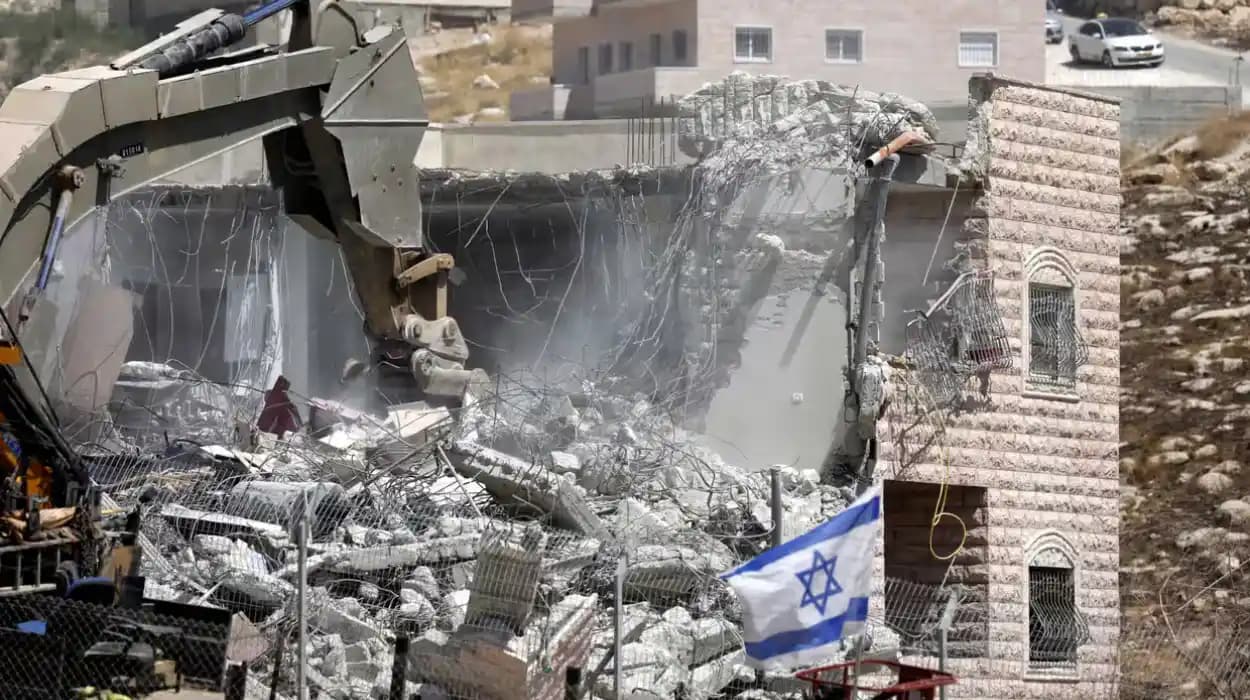On Tuesday morning, Israeli occupation forces conducted a demolition operation in the town of Anata, located northeast of Jerusalem. The targeted structure was a Palestinian-owned residential building, part of a continuing pattern of demolitions in the Jerusalem Governorate and surrounding areas. This latest event has further intensified the already volatile situation in the region, drawing widespread condemnation and raising concerns about the humanitarian impact on Palestinian families.
The Demolition Operation in Anata
Israeli forces stormed Anata early on July 8, 2025, and proceeded to demolish a residential building. The operation involved multiple excavators that systematically tore down the structure, which was reportedly four stories high and owned by Mahmoud Abu Al-Hawa. Local residents and the building’s owner were prevented from accessing the site during the demolition, which was carried out under the pretext of lacking an Israeli-issued building permit.
The United Nations Office for the Coordination of Humanitarian Affairs (OCHA) has documented a sharp increase in such demolitions, noting that since the beginning of the year, Israeli authorities have destroyed over 320 structures in the Jerusalem Governorate alone, displacing nearly 600 Palestinians. More than half of these demolitions occurred in occupied East Jerusalem, where 182 structures were razed, leading to the displacement of 489 people.
Israeli Authorities’ Justification and Palestinian Response
Israeli officials frequently cite the absence of building permits as the legal basis for demolitions. However, obtaining such permits is notoriously difficult for Palestinians due to stringent Israeli regulations, especially in Area C of the West Bank, which remains under full Israeli administrative and security control. This policy has been widely criticized as a means to restrict Palestinian development and expand Israeli settlements.
Local Palestinian authorities and human rights organizations condemn these demolitions as punitive measures aimed at displacing Palestinians and altering the demographic balance in Jerusalem. Mahmoud Abu Al-Hawa, the owner of the demolished building, expressed deep frustration, highlighting the hardship imposed on his family and the community. The demolitions not only destroy homes but also disrupt lives and livelihoods, exacerbating the humanitarian crisis in the occupied territories.
Broader Context of Demolitions and Conflict
The demolition in Anata is part of a broader trend of Israeli military and municipal actions targeting Palestinian properties. For instance, earlier in July, the Jerusalem Municipality compelled Mahmoud Burqan to self-demolish his family home in Wadi al-Joz, another East Jerusalem neighborhood. These actions occur against a backdrop of escalating tensions, including violent clashes and protests in Jerusalem, the West Bank, and Gaza.
The situation is further complicated by previous Israeli military operations in Gaza, such as the 2021 airstrike that destroyed a high-rise building housing media offices, including those of The Associated Press and Al-Jazeera. That strike, which was justified by Israel on the grounds that Hamas used the building for military purposes, drew international condemnation for targeting civilian infrastructure and media outlets.
International and Media Reactions
The demolition of Palestinian homes near Jerusalem has attracted significant international attention. Humanitarian organizations warn that such actions contribute to a cycle of displacement and violence, undermining prospects for peace. The United Nations and various NGOs have called on Israeli authorities to halt demolitions that violate international law and exacerbate the humanitarian situation.
Media outlets covering the demolitions emphasize the human cost. Videos and reports from local media and activists document the destruction and the emotional toll on affected families. Social media platforms have been flooded with images and testimonies, amplifying calls for international intervention.
Humanitarian Impact and Displacement
The demolition of residential buildings in and around Jerusalem leads to immediate displacement of families, often with little or no notice. Displaced Palestinians face severe challenges in finding alternative housing, especially under restrictions imposed by Israeli authorities. The loss of shelter also impacts access to education, healthcare, and employment, deepening poverty and instability.
The United Nations reports that punitive demolitions and forced evictions in Area B and Area C of the West Bank have displaced dozens of people in recent weeks alone. These actions contribute to a deteriorating humanitarian landscape, with vulnerable populations bearing the brunt.
The demolition of the Palestinian residential building in Anata near Jerusalem on July 8, 2025, underscores the ongoing tensions and humanitarian challenges in the occupied territories. Israeli authorities maintain that demolitions are legal enforcement actions against unauthorized construction. In contrast, Palestinians and international observers view them as part of a systematic effort to displace Palestinians and consolidate control over Jerusalem and its environs.
As the situation remains tense, with frequent demolitions and confrontations, the prospects for peace and stability in the region appear increasingly fragile. The international community continues to call for restraint, respect for human rights, and renewed efforts toward a just resolution of the Israeli-Palestinian conflict.
"The demolition of Palestinian homes is not just about buildings; it is about uprooting families and erasing communities,"
said a local Palestinian activist.
"Each destroyed home is a blow to the hope for peace and coexistence."
"Israel’s policy of demolishing homes under the guise of permit violations is a clear violation of international law and human rights,"
stated a spokesperson for the United Nations Office for the Coordination of Humanitarian Affairs.
"We urge all parties to respect the dignity and rights of civilians."
